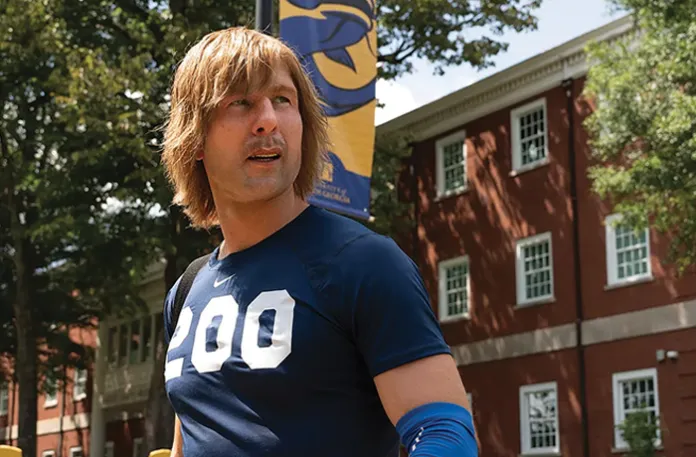The NFL had Ballers, Dwayne Johnson’s five-season saga of unsportsmanlike conduct. High school football had Friday Night Lights — at its peak, one of the best shows on TV. But not since Craig T. Nelson’s Coach put down its whistle nearly three decades ago has the college game put serious points on the scripted-television board. Now, with the premiere of Hulu’s sweetly imbecilic Chad Powers, that long scoreless stretch looks set to end.
The six-episode series is produced by Eli and Peyton Manning, among others. As such, the prevailing tone is more than a little reminiscent of the elder sibling’s Nationwide Insurance ads: Motivatin’ Manning, but with swears. The star of the show, Twisters’s Glen Powell, plays Russ Holliday, a washed-up Oregon quarterback turned conspiracy theorist and lout. When, inspired by his father’s job as a Hollywood prosthetics man, Russ creates an alter-ego, a new Division 1 career is launched. Before long, and thanks to a fake schnoz that deserves its own “worst makeup” Emmy, our hero is back on the field as the eponymous, ridiculous Chad Powers.
I would be lying if I said the show isn’t amusing. An opening sequence in which Russ self-destructs during the Rose Bowl is pure gonzo hilarity, culminating in a Make-a-Wish kid’s slapstick wheelchair collapse. Russ himself is cleverly drawn, name-dropping his “buddies in crypto and NFT” one moment and questioning the legitimacy of Osama bin Laden’s death the next (Get in line.) Like Apple TV’s COVID-19-era hit Ted Lasso, the success of which other streaming services will clearly be chasing forever, Chad Powers fills its ranks with pathos-inducing supporting characters, most notably Jake Hudson (Steve Zahn) and Ricky’s (Perry Mattfeld) father-daughter coaching duo and disoriently wholesome QB2 Gerry (Colton Ryan). Nevertheless, physical comedy is the production’s MVP. I will not soon forget a scene in which Russ must dig around “in” his face to kill a fly that has burrowed there.

The series is set at the fictional University of South Georgia, a minor football power that somehow boasts a pro-style stadium. Other stretches of the imagination are even more perplexing. How, for example, does Russ go undetected as Chad despite a prosthetic job that barely alters his appearance? In what universe would the NFL refuse to employ a college superstar on the basis of one mental error and a few tasteless posts (“The fans didn’t make you tweet that crap about Princess Diana,” Russ’s father scolds)? Many of these puzzlers are necessary to make the plot whirr, and social verisimilitude was never going to be the show’s calling card in any case. Still, the minor unrealities add up. By the time Russ’s accomplice, Danny Cruz (a catty Frankie Rodriguez), begins listening to The Phantom of the Opera, many viewers will be openly scoffing. Are we meant to believe this child is a gay college hipster, or aren’t we? Try Stephen Sondheim or William Finn.
What Chad Powers does know is football. Indeed, the series’s in-game sequences are as good as anything on Friday Night Lights and markedly better than what Any Given Sunday (1999) or Rudy (1993) served up. As has been widely reported, the Manning brothers trained Powell to within an inch of his life, and the actor’s throwing motion and footwork could probably get him a scholarship offer in real life. The result, however, is a curious imbalance. The show fairly wallows in its own absurdity, yet much of its run time consists of hyper-professional athletic simulations. To put it another way, Chad Powers is a sports dramedy that ought to have been an outright comedy. Audiences surely won’t care whether the South Georgia Catfish win the big game, but we do enjoy a good laugh.
REVIEW: BRITISH ESPIONAGE BLUES
A better lead might have provided even more of them. As Russ, Powell is deliciously vile, occupying a cultural space typically reserved for manosphere influencers. Think Andrew Tate, but with “the arm of a Yugoslav mortar launcher.” As Chad, on the other hand, the actor channels a breathy weirdo with all the virility of a purity bracelet. Not for nothing does an assistant coach call his new quarterback “Sling Blade.” I suppose we’re meant to laugh at Russ’s creation on the sheer basis of his stupidity. The character hems and haws, utters vaguely Southern non sequiturs, and generally comes across as a mentally disabled Frankenstein’s monster. Yet silliness is not necessarily funny. And boy, does it get old as Chad comes to dominate more and more of the series’s attention.
It is to the show’s credit, then, that something not just watchable but occasionally delightful emerges from all of this mess. Mattfeld shines as Ricky Hudson, a female assistant battling accusations of nepotism on the sideline. A mid-season episode features the best use of Stan Bush’s 1986 rock anthem “The Touch” since Boogie Nights (1997). Journeyman actress Wynn Everett steals more than one scene as a deranged booster obsessed with the team. Through it all, the production offers a confident smirk and keeps the plot zipping merrily along. There are worse ways to spend a half-hour.
Graham Hillard is editor at the James G. Martin Center for Academic Renewal and a Washington Examiner magazine contributing writer.
